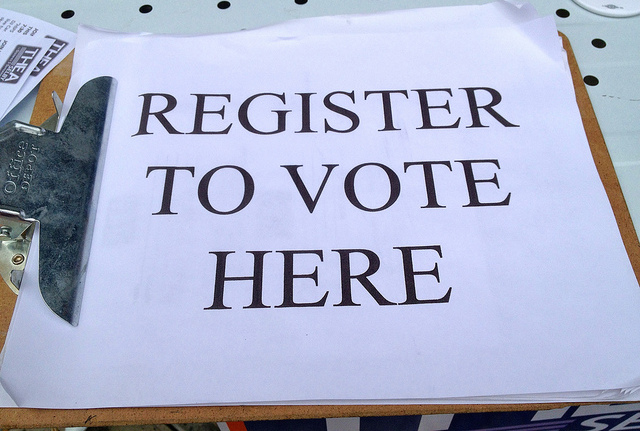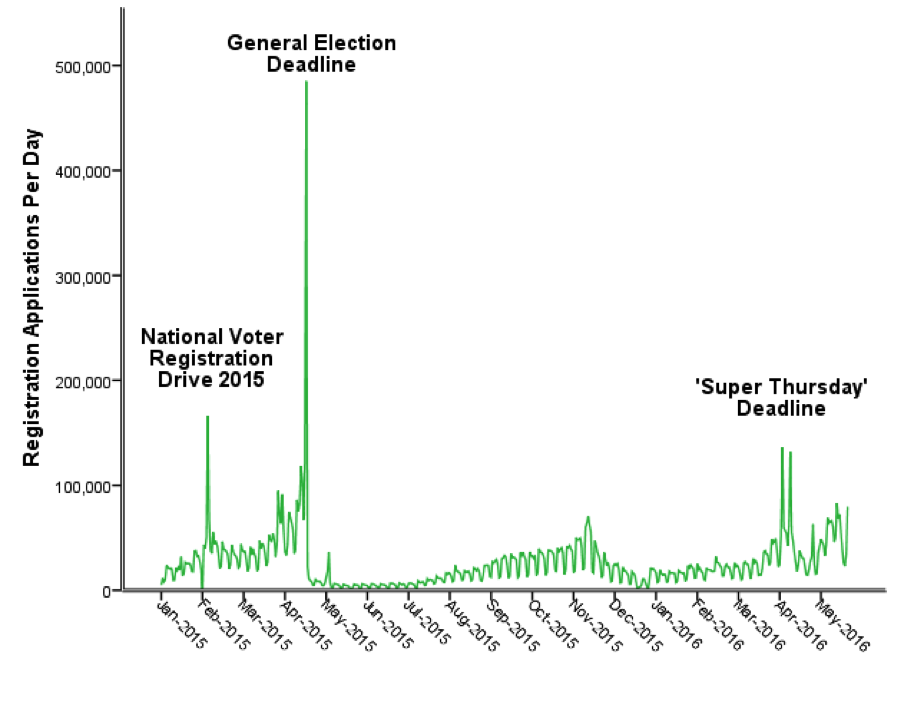Let’s stop the last minute registration rush: It’s time for a complete and inclusive electoral register for Britain
As the deadline for registering for the EU referendum looms, Lord Rennard, Toby James and Oliver Sidorczuk highlight the problem with last minute scrambles and argue that the UK should draw on lessons from abroad to achieve a comprehensive electoral register.
Credit: Lynn Friedman CC BY-NC-ND 2.0
Registration for the EU Referendum will close at midnight, 7 June. If you’re not on the electoral roll, it’ll be too late – you won’t be able to vote. The UK will be ‘in’ or ‘out’ the EU and this once-in-a-generation decision will have been made, for better or worse, without you.
In the final weeks before the passing of each registration deadline there’s often a last minute surge in registrations. There is a human tendency to leave things to the last minute. This also coincides with campaign activity from organisations like Bite The Ballot, the Electoral Commission, local authorities, parties and campaigners to get more names onto the register. Nearly half a million registered to vote on the last possible day for the 2015 General Election last year, as the spike below shows. 132,000 did so on the last day before ‘Super Thursday’ in May 2016. Registrations are creeping up again as the 7 June deadline looms.
Figure 1: Electoral registration applications 2015-16. Source: authors, based on data in https://www.gov.uk/performance/register-to-vote/registrations-breakdown
Millions of people will still not be on the register, however. Some, unaware of the deadline, will register too late. Before the last General Election, 186,000 applied after the deadline. Others may think that they’re already registered and turn up at the polls anyway. Many citizens think that they are on the register because the pay their council tax and expect those running the election to ‘know about them’. Two thirds of polling stations turned away voters who thought that they were on the electoral register but were not.
There is a much bigger picture, however. A report on the 2014 registers by the Electoral Commission suggests that 7.5 million people could be missing. Our analysis, based on this Electoral Commission data and Office of National Statistics mid-year population estimates from 2014, is that registration is an especially concerning problem for young people. Roughly 3 million of the ‘missing millions’ are from the 18 to 30 age group. This compares to the half a million of 55-64s thought to be missing – a much lower, but still clearly troubling, statistic.
The landscape after IER
But that was 2014. Since then, the Government has introduced major changes to the registration process with the stated aim of combating electoral fraud. The Government began the implementation of individual electoral registration (‘IER’) in 2014 which meant that everyone had to register individually and had to provide a N. I. number so that their details could be checked first. Findings from a University of East Anglia survey of electoral administrators showed that two-thirds of electoral administrators agreed that citizens had complained to them about the process being bureaucratic. And worryingly, roughly half of electoral officials thought that the completeness of the register had declined.
The problem with last minute scrambles
But that’s not the end of the problem. Moving to IER has involved major organisational and technological changes in the context of major cuts to local government funding, as raised in a House of Lords debate on this issue recently. The electoral officials whose job it is to compile the register have been under severe strain. Half of electoral administrators said that they’d thought about leaving their job at some point in the last year, research shows.
A late surge in registrations may therefore cause a further challenge for the UK’s electoral machinery. Officials will have to check each application against government databases to ensure that they are legitimate registrations. If citizens are unsure whether or not they are on the register, they will need to phone up their local officials to ask them (if they can find the number). Many of those who are already registered, might decide to apply again, just to make sure, leaving another application to be processed. Many electoral services may therefore be under strain.
A new way forward
It doesn’t have to be this way. The way voter lists are compiled varies enormously worldwide, with huge variations in the consequences for democracy. We have the ability to pick and choose best practice from elsewhere – from replicating Northern Ireland’s ‘schools initiative’ or the USA’s ‘Motor Voter’ Act – in creating a more inclusive and efficient electoral processes. Voter registration could just be automatic as it is in Denmark or Sweden. So why isn’t it?
Earlier in the year, a report from the All-Party Parliamentary Group on Democratic Participation on the ‘Missing Millions’ presented tried and tested solutions from experiences at home and abroad. This is an issue that’s often kicked into the long grass in the UK. The system was devised in 1918 and remained largely unchanged until 2014. Having undertaken major changes to reduce opportunities for electoral fraud, now is the time to focus on creating a stronger, more inclusive democracy by keeping up momentum, and aiming for a complete register.
‘Missing Millions’ set out workable solutions. Once the EU referendum is over, it will be the time for politicians of all parties to work together in enacting change.
—
Note: this post represents the views of the authors and not those of Democratic Audit or the LSE. Please read our comments policy before posting.
—
Lord Rennard MBE is a Co-Chair of the All-Party Parliamentary Group on Democratic Participation.
Dr. Toby James is a Senior Lecturer at the University of East Anglia and Fellow to the APPG.
Oliver Sidorczuk is Bite The Ballot’s Advocacy Coordinator, and APPG convener.








 Democratic Audit's core funding is provided by the Joseph Rowntree Charitable Trust. Additional funding is provided by the London School of Economics.
Democratic Audit's core funding is provided by the Joseph Rowntree Charitable Trust. Additional funding is provided by the London School of Economics.
Let’s stop the last minute registration rush writes @TobySJames @democraticaudit https://t.co/JcoDipvzrO #EUref #UEA
[…] to registration, with Lord Rennard, Toby James and Oliver Sidorczuk pointing out in an article for Democratic Audit that at the last General Election, 186,000 applied after the deadline, while ‘others may […]
“Voter registration could just be automatic as it is in Denmark or Sweden. So why isn’t it?”
Well, because Fuck You.
https://t.co/Ee33rQu6ND
RT @UEA_Health: Let’s stop the last minute registration rush writes @TobySJames @democraticaudit https://t.co/ZY3KoV70g8
#EUref #UEA
It’s time for a complete electoral register for Britain https://t.co/vy7gkmJnal #MissingMillions https://t.co/B2OAcVJ6GS
Let’s stop the last minute registration rush writes @TobySJames @democraticaudit https://t.co/1PTM3VjEhF #EUref #UEA
Would be better if one had the option to opt-out rather than register and opt-in. #election #EUref #RegisterToVote
https://t.co/DFEp3EE3wR
RT @UEAResearch: Let’s stop the last minute registration rush writes @TobySJames @democraticaudit https://t.co/Kq5mZ9qvzk #EUref #UEA
[…] Note: this post was originally published on Democratic Audit. […]
Lets stop lets stop! https://www.dubairentacar.org
Let’s stop the last minute registration rush: It’s time for a complete and inclusive electoral register for Britain https://t.co/a7HWn5oVJM
Let’s stop the last minute registration rush: It’s time for a complete and inclusive electoral register for Britain https://t.co/OvTh2Hzmoj
Let’s stop the last minute registration rush writes @TobySJames @democraticaudit https://t.co/0oxbCnY2To #EUref #UEA
Not registered yet? Let’s stop the last minute registration rush writes @TobySJames @democraticaudit https://t.co/BcBcD6esZy
#EUref #UEA
Let’s stop the last minute registration rush writes @TobySJames @democraticaudit https://t.co/EhODGknymK #EUref #UEA
@democraticaudit @LordRennard @TobySJames @OliverSidorczuk agreed, & reform postal votes, require photo ID, no ‘directed’ directions.
Let’s stop the last minute registration rush: It’s time for a complete and inclusive electoral register for Britain https://t.co/4thp63LQFv
Let’s stop the last minute registration rush
https://t.co/l1ITcYV9Wr #EUref #EURefUEA
Let’s stop the last minute registration rush: It’s time for a complete and inclusive… https://t.co/AyFPm6BOOX https://t.co/bXu4aWat5z